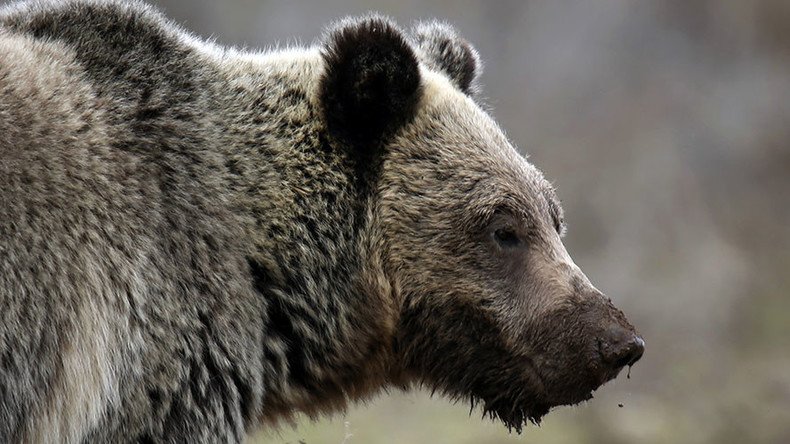Accusations in beloved Yellowstone grizzly’s death provoke tensions with local tribes

Confirmation from Montana wildlife officials that one of Yellowstone National Park’s most beloved grizzly bears, Scarface, was illegally killed by a hunter has reignited tensions between tribal and non-tribal hunters.
Known to biologists as Bear 211 but to tourists as Scarface, the grizzly was shot in November 2015 and with the Yellowstone grizzly bear listed as threatened under the Endangered Species Act, the US Fish and Wildlife Service (FWS) is investigating the matter.
a bear that I had the pleasure of seeing one day in Yellowstone has passed. Rest In Peace Scarface pic.twitter.com/pvYwWXs1QV
— mc hammer (@madisoncherry88) April 25, 2016
R.I.P Scarface
— Wolves o the Rockies (@WolvesotRockies) April 26, 2016
We will miss your presence on the Yellowstone's landscape.
FWP confirms grizzly killed near... https://t.co/L3HreWiWai
“I don’t know if it was self-defense or mistaken identity,” says Ron Aasheim, a spokesman for Montana Fish, Wildlife and Parks (MFWP), according to Native News. “The USFWS is leading the investigation and until that is done they are not releasing the name of the hunter.”
Weighing almost 600 pounds in his prime, Scarface had, since 1993, been captured 17 times by the Interagency Grizzly Bear Study Team (IGBST) and was one of the most studied.
His name stems from the many scars around the bear’s neck, thought to be as a result of the many fights he would have been involved in over the years.
The confirmation of the bear’s death has caused controversy for those living in the Gardiner area of Park County nearby Yellowstone, with anger being mainly directed at tribal members from the Nez Perce, the Confederated Salish and Kootenai Tribes, the Shoshone-Bannock Tribes, and the Confederated Tribes of the Umatilla Indian Reservation.
Non-tribal members claim it was a tribal hunter who killed the 25-year-old grizzly, with many taking to local media sites and blogs airing “anti-Native sentiment."
It's always a good day when you see #Scarface, #Yellowstone Grizzly #211. Long live the king! pic.twitter.com/hkTStNrXlW
— Sandy Sisti (@YellowstoneWild) July 30, 2014
The tension is deep rooted with the most recent airing of anger being at a public meeting in February in Gardiner surrounding the tribal hunting of elk and bison just north of Yellowstone.
Even though the four tribes do have treaty rights established since 1855 to allow them to hunt in the area, locals are not happy with the free reign.
“We’re pretty upset with the Native Americans shooting elk right now,” said Pat Hoppe, a Gardiner retiree, at the time.
Keep your distance: #Yellowstone National Park in danger of being ‘loved to death’ https://t.co/KpxNVRX87epic.twitter.com/zIzNH0xLWj
— RT (@RT_com) April 21, 2016
Johnny Arlee, traditional leader of the Confederated Salish and Kootenai Tribes (CSKT) of the Flathead Indian Reservation in Montana says it could not have been a tribal hunter as “the grizzly bear is very sacred” to them.
“It’s a good thing that the CSKT council is backing other tribes in protecting the grizzly bear. They know that our animals are precious,” Arlee says. “As Native people we have faith in the animal world. Grizzlies are very powerful.”
#Scarface .. spotted him yesterday (7/21/15) swimming across the #Yellowstone River in #YellowstoneNationalParkpic.twitter.com/yB8lfu7G4O
— Yellowstone Leo (@Yellowstone_Leo) July 21, 2015
These sentiments have been echoed by Aasheim too, who says “it’s safe to say that’s inaccurate information that it was a tribal hunter,” adding that he didn’t know “of any instances where elk or bison were just shot and left by tribal members.”
The Rocky Mountain Tribal Leaders Council (RMTLC), of which CSKT is a member, passed a motion to oppose the delisting and trophy hunting of the grizzly bear, something which FWS is considering at present.
Yellowstone grizzlies could be fair game for hunters under new rules https://t.co/xEqCsGqARbpic.twitter.com/l1UOZgD9GI
— RT America (@RT_America) December 9, 2015
GOAL Tribal Coalition Co-founder, R. Bear Stands Last says the five month delay in announcing Scarface’s death was an intentional move by FWS to not “hinder” the “narrative” around the Yellowstone grizzly being delisted.
“Telling millions of people who have seen Yellowstone’s most famous grizzly that the bear had been killed by a hunter would have changed the dynamic and inspired more opposition and negative public comment,” said Bear Stands Last.
“It would have contributed to derailing [FWS’s Grizzly Bear Recovery Coordinator, Chris] Servheen’s and [FWS Director, Daniel] Ashe’s agenda,” Bear Stands Last adds.












